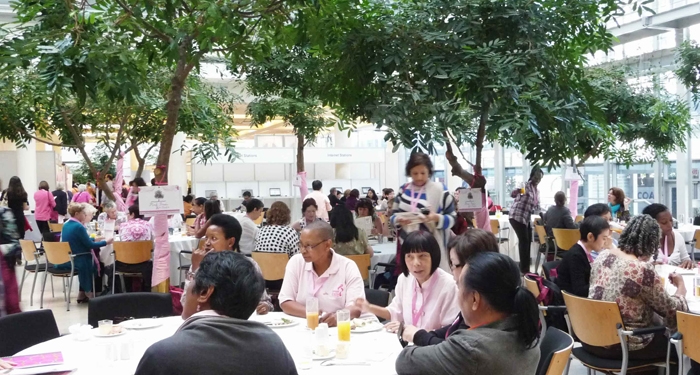A few weeks ago thanks to sponsorship by pharmaceutical company Novartis I represented Breast Cancer Care at the Reach to Recovery conference in Cape Town South Africa.
Improving the treatment support and care of people affected by breast cancer is a core part of our work here. Sometimes this means we get the chance to learn about and help spread gold standard care and support initiatives at international events.
A few weeks ago thanks to sponsorship by pharmaceutical company Novartis I represented Breast Cancer Care at the Reach to Recovery conference in Cape Town South Africa.
Reach to Recovery International is a breast cancer support network that works with organisations from around the globe to improve the quality of life for women with breast cancer and their families. It does this by encouraging volunteer support of women with breast cancer by people who’ve been through the same experience.
More the same than different
Despite being unsure what to expect on day one I instantly felt at home. I was surrounded by more than 400 women and some men from 42 countries (many from the developing world) who cared passionately about improving the quality of life of people affected by breast cancer. Nurses doctors pharmacists patients partners friends campaigners: we all had the same aim – to make a difference by sharing our experiences and learning from each other.

I planned to share information about our Moving Forward partnership courses for people trying to move on with their lives following treatment for breast cancer. Also how we use social media to spread important information about breast awareness and our services.
But I started to wonder what I could say that could possibly benefit many of the other delegates. Or indeed how their experiences could be translated to the UK.
Many of them live in countries where breast cancer is taboo and the vast majority of people aren’t diagnosed until they have very advanced secondary breast cancer. Treatments are limited or not available and some don’t have reliable water supplies in their hospitals never mind drugs and skilled health professionals.
But it quickly became obvious that the same issues matter around the world:
- early detection and awareness
- access to the best available treatment
- emotional support including talking to others who’ve had breast cancer
- lobbying government and health providers so that breast cancer isn’t ignored or forgotten.
Our aims were the same so we could learn from each other.
Breast awareness
I met some amazing courageous people and came away with fresh thinking about how we might reach African and South Asian communities in the UK with vital breast awareness messages.
I also made some contacts with people who could help us do this effectively.
In return I was able to share our publications ways of working and ideas with people who wanted to learn from us.
Breast cancer facts: UK and developing world
|
In the UK |
In the developing world |
|
Around 55000 people are diagnosed with breast cancer each year |
There is a severe lack of medical expertise and commitment to diagnose and treat breast cancer |
|
Just under 12000 people die from breast cancer every year |
A majority (69%) of all breast cancer deaths occurs in developing countries according to the World Health Organization |
|
Most people are diagnosed with primary breast cancer |
Most people are diagnosed with secondary breast cancer |
|
Most people feel able to tell their family and friends about their diagnosis without fear of the consequences |
Breast cancer is frequently stigmatised with many people believing cancer can be caught or is a punishment for promiscuous behaviour. If women talk about their diagnosis they can be cast out by their community. They will often find they have no home friends family or food. |
*We’ll post more news from the conference on Tuesday 7 May